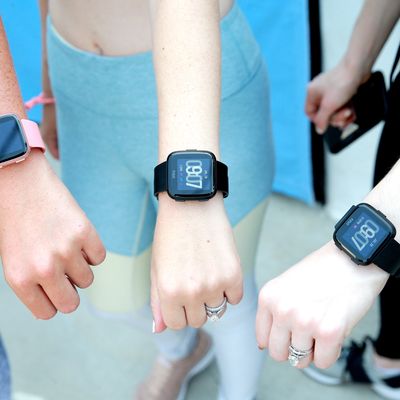
On Tuesday, life insurance provider John Hancock announced it would be rolling out a change for all incoming customers. If you signed up for a life insurance policy, you would be automatically enrolled in a program called “Vitality Go,” which provides policy holders with free stuff (think: gift cards or discounts at the grocery store) if you you hit certain health goals, from walking a certain number of steps to having low blood pressure. If you want, you can also sign up for “Vitality Plus,” a $2 a month service that does the same thing, but potentially knocks up to 15 percent off your premiums if you hit certain health goals.
Reuters wrote up the news with the headline “Strap on the Fitbit: John Hancock to sell only interactive life insurance.” As internet aggregation slowly mutated that headline, you got stories like “Watch now mandatory for John Hancock life insurance” or “Fitness Trackers Now Mandatory for All John Hancock Life Insurance Policies.” You eventually got tweets like this:
Despite the Black Mirror references, what John Hancock is proposing here is relatively innocuous. (And yes, I know: the point of nearly every Black Mirror episode is that relatively innocuous stuff leads to unforeseen horrors.) No one will be forced to report more health data than they normally would to get a life insurance policy from John Hancock. No Fitbits or Apple Watches will be mandated for policy holders — it’s just a somewhat boring way to save a little on life insurance.
Brooks Tingle, president and CEO at John Hancock Insurance, remained upbeat about the news, even after having some of those above tweets read to him. For Tingle, the program is about encouraging people to be healthy. They lose nothing if they choose not to participate in the program — they just gain either free stuff or discounts on their premiums if they choose to take part. “We’re into carrots, not sticks,” says Tingle.
Carrots are great! But the issue — and a legitimate reason to worry — is that even carrots can be used for malign purposes. The classic example: A grocery store rewards card, which nets you cheap deals on seltzer in exchange for the grocery store selling your data. Hancock, at least, promises not to sell any data about your health habits to third parties.
So if Hancock’s program is so innocuous, why so much online angst about it? For one, it’s part of a larger trend where consumers are asked to willingly give up data in order to save a few bucks. “What concerns me is that people are being told that wearing these devices will get them discounts and gift cards, but they are giving up enormously detailed portraits of their lives,” says Kate Crawford, technology critic and co-founder of AI Now. “People are being asked to trade their physical data 24/7 without knowing if it will come back to hurt them later.” While Hancock can promise to keep the data secure and never sell it to third parties, data breaches ranging from Equifax to Under Armour have shown how easy it is for personal data kept to slip out of a company’s servers.
Crawford, who’s studied the implications of personal tracking devices, calls Hancock’s program “a recipe for deepening inequality,” as less wealthy people are under ever greater pressure to turn over the data in exchange for necessary savings. For her, it’s the start of a long descent down a slippery and tightly monitored slope. “What’s the danger?” she asks. “That this is just the beginning of a punitive form of surveillance capitalism that uses data against us, and disproportionately harms the marginalized.”
Luckily, for now, there are other life-insurance policies you can take out with no tracking component. And even setting that aside, to me, Hancock’s program doesn’t seem that scary. It’s a discount program the company hopes will help make it more money by having its customers live slightly longer — not all that different from a safe-driving discount with your auto insurer. It might be a bit ominous to report your fitness levels to your insurer, but that seems small compared to the amount of data you’re turning over to major tech platforms every time you use the internet.
The furor over Hancock’s decision is a scope into our latent anxieties. What the John Hancock Insurance company is offering is a question you’re likely to going to be asked more and more: do you want to let a company in on some of what you do in your daily life in order to save a few bucks? It’s a tempting offer! And it’s your decision about whether or not to take the discount — for now.





























